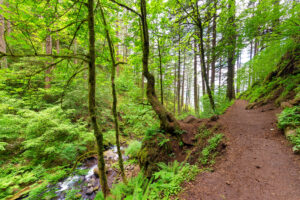
How Climate Change Is Affecting Native Trees in Portland, OR
Climate change is a global issue with vastly different local effects, from drought to deluge, rising waters to parched fields. Climate change is affecting native trees in Portland, Oregon, and surrounding areas in the Pacific Northwest in ways that are becoming increasingly evident and concerning.
The Impact of Drought and Insects on Red Cedar and Douglas Fir
Red Cedars and Douglas Firs, iconic trees of the Pacific Northwest, are feeling the brunt of climate change. According to the Associated Press working in concert with Columbia Insight, prolonged drought has weakened and killed trees at lower elevations, and made weakened trees more susceptible to pests and diseases. Insects, which are multiplying faster due to warmer temperatures, are attacking these weakened trees, causing significant damage and even death in some cases.
Atmospheric Rivers
The Pacific Northwest has experienced previously unheard-of periods of extreme heat, drought, and massive wildfires. Atmospheric rivers have also dumped record-breaking rains across the area. These climate events can have devasting effects on drought-weakened trees, whose roots are losing their grip on the earth where they stand. These trees can’t hold the soil in place as well as they used to, making landslides more likely and dangerous. Mud or landslides take these trees down with them and leave a devasted landscape that may take decades to recover.
Assisted Migration vs. Reforestation
Assisted migration is one proposed response to help native trees survive climate change. Assisted migration involves moving tree species to more favorable climates where they are more likely to thrive. KGW-TV of Portland reports that this strategy is gaining popularity as it offers a proactive approach to preserving native tree species.
Assisted migration differs from another type of climate change mitigation effort, reforestation, which is the replanting of trees in areas where forests have been cut down or destroyed. While both assisted migration and reforestation aim to combat the effects of climate change on native trees, they differ in their approach and potential impact. Assisted migration addresses the issue at its root, by helping trees adapt to changing climates, whereas reforestation focuses on rebuilding what has already been lost.
The Homeowner’s Role in Protecting Native Trees
Acting promptly is essential if you are a homeowner and notice dying trees on your property. Consider reaching out to local arborists who can provide guidance on tree removal or other necessary steps.
Homeowners can play a significant role in mitigating the effects of climate change on native trees. Options include planting more drought-resistant varieties and realizing that existing trees that used to take care of themselves may now need more frequent watering.
We might mitigate climate change affecting native trees in Portland, Oregon, and elsewhere in the Pacific Northwest by using strategies like assisted migration and active participation and planting more drought-resistant trees. Homeowners can help by joining in the effort to plant more drought-resistant trees. These efforts could help preserve the area’s lush green landscapes.
Remember, every tree matters, and every action counts.